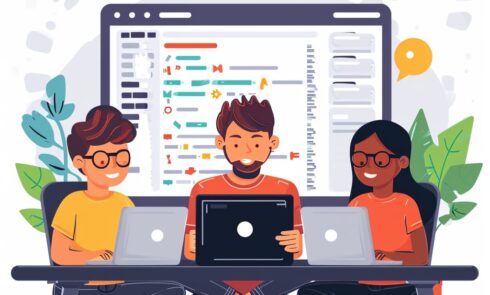Ah, the world of programming. I’ve been wandering its corridors longer than many of you have been alive. From the days when punch cards were the norm, through the rise of assembly language, to the modern age of sophisticated algorithms and languages like Python and JavaScript, I’ve seen it all. Staying sharp in this ever-evolving landscape isn’t just a matter of keeping up with the latest trends; it’s about maintaining a mindset that embraces change and continuous learning.
The Eternal Dance with Change
In programming, change is the only constant. Technologies that were cutting-edge a few years ago can become obsolete in the blink of an eye. This isn’t a cause for despair but an opportunity for growth. Here are some key strategies that have helped me stay sharp over the decades.
Embrace Lifelong Learning
- Continuous Education:
- Online Courses: Websites like Coursera, Udemy, and edX offer a plethora of courses on the latest technologies. Never stop learning.
- Books: Don’t underestimate the value of a good book. Whether it’s a classic like “The Pragmatic Programmer” or new releases on AI and machine learning, books provide depth and context that other resources might lack.
- Certifications:
- Earning certifications can help validate your skills and keep you motivated. They also demonstrate to employers that you’re committed to staying current.
- Hands-On Projects:
- Nothing beats practical experience. Engage in personal or open-source projects that challenge you to apply new concepts. This not only hones your skills but also builds a portfolio that showcases your expertise.
Stay Connected with the Community
- Networking:
- Attend conferences, meetups, and webinars. They are excellent opportunities to meet like-minded individuals and stay updated on industry trends.
- Online Forums: Join forums like Stack Overflow, Reddit, and specialized communities on Discord or Slack. Engage in discussions, ask questions, and share your knowledge.
- Mentorship:
- Both being a mentor and having a mentor can be incredibly beneficial. Mentoring others forces you to articulate your knowledge clearly, reinforcing your own understanding.
Leverage the Power of Modern Tools
- Version Control Systems:
- Git has become the gold standard. If you haven’t yet mastered it, now is the time. Version control systems are essential for collaborative projects and personal version management.
- Integrated Development Environments (IDEs):
- Modern IDEs like Visual Studio Code, IntelliJ IDEA, and PyCharm offer features that can significantly enhance your productivity. Learn their shortcuts and extensions to speed up your workflow.
- Automation:
- Automate repetitive tasks with scripts and tools. This not only saves time but also reduces the risk of errors. Embrace tools like Docker for containerization, Jenkins for continuous integration, and Ansible for automation.
Balance Tradition with Innovation
- Core Concepts:
- Don’t forget the fundamentals. Algorithms, data structures, and design patterns are timeless. A strong grasp of these concepts will make learning new languages and frameworks easier.
- New Technologies:
- Keep an eye on emerging technologies like blockchain, quantum computing, and AI. Even if they aren’t immediately relevant to your work, having a foundational understanding can prepare you for future opportunities.
- Legacy Systems:
- Sometimes, old systems need to be maintained or integrated with new ones. Understanding legacy code can be a valuable skill, and modernizing these systems can be a rewarding challenge.
Cultivate a Growth Mindset
- Adaptability:
- Be open to new ideas and willing to adapt. The tech world moves quickly, and flexibility is key to staying relevant.
- Resilience:
- Don’t be discouraged by failures. Each bug, crash, and setback is an opportunity to learn and grow. The best programmers are those who persevere through challenges.
- Curiosity:
- Stay curious. Always ask questions, explore new technologies, and seek out knowledge. A curious mind is a sharp mind.
Practical Tips for Staying Current
- Regularly Update Your Skills:
- Dedicate time each week to learning something new. This could be reading articles, watching tutorial videos, or coding a small project.
- Follow Industry Leaders:
- Follow blogs, podcasts, and social media accounts of industry leaders and organizations. They often share valuable insights and updates on the latest trends.
- Experiment and Play:
- Don’t be afraid to tinker. Experiment with new languages, frameworks, and tools. Sometimes, the best learning happens through play.
A Veteran Programmer’s Guide to Staying Sharp (Continued)
Navigating the Tech Landscape
As we delve deeper into the digital age, it’s crucial to navigate the ever-changing tech landscape with a keen eye and an open mind. Here are additional insights and strategies to help you maintain your edge as a veteran programmer.
Mastering the Art of Problem-Solving
- Break Down Complex Problems:
- Complex problems can be overwhelming. Break them down into smaller, manageable parts. This approach makes it easier to identify and address each component systematically.
- Algorithmic Thinking:
- Develop strong algorithmic thinking. Practice solving problems on platforms like LeetCode, HackerRank, and Codewars. This not only sharpens your skills but also prepares you for technical interviews.
- Debugging Skills:
- Hone your debugging skills. Learn to use debugging tools effectively and develop a methodical approach to identifying and fixing issues. Patience and persistence are key.
Embracing Collaborative Development
- Agile Methodologies:
- Familiarize yourself with Agile methodologies like Scrum and Kanban. These frameworks promote iterative development, continuous feedback, and collaboration, which are essential in modern software development.
- Code Reviews:
- Participate in code reviews, both as a reviewer and a reviewee. Code reviews foster knowledge sharing, improve code quality, and help you stay updated with best practices.
- Pair Programming:
- Engage in pair programming sessions. Working closely with another programmer can expose you to new perspectives and techniques, enhancing your problem-solving abilities.
Keeping Your Codebase Clean
- Refactoring:
- Regularly refactor your code to improve its structure, readability, and maintainability. Clean code is easier to understand and modify, reducing technical debt over time.
- Documentation:
- Maintain comprehensive documentation. Good documentation helps future-proof your projects by making it easier for others (and yourself) to understand and work with your code.
- Testing:
- Emphasize the importance of testing. Write unit tests, integration tests, and end-to-end tests to ensure your code is robust and reliable. Tools like JUnit, Selenium, and pytest can be invaluable.
Adopting a Balanced Lifestyle
- Health and Wellness:
- Don’t neglect your physical and mental health. Regular exercise, a balanced diet, and adequate sleep are crucial for maintaining cognitive function and overall well-being.
- Work-Life Balance:
- Strive for a healthy work-life balance. Taking breaks and spending time on hobbies can recharge your mind and prevent burnout, ultimately making you more productive and creative.
- Mindfulness and Stress Management:
- Practice mindfulness and stress management techniques. Meditation, yoga, and deep-breathing exercises can help you stay calm and focused, especially during challenging projects.
Leveraging Emerging Technologies
- Artificial Intelligence and Machine Learning:
- Explore the world of AI and machine learning. These technologies are transforming various industries and offer exciting opportunities for innovation. Familiarize yourself with frameworks like TensorFlow, PyTorch, and scikit-learn.
- Cloud Computing:
- Gain expertise in cloud computing platforms such as AWS, Azure, and Google Cloud. Understanding cloud services and architecture is essential for modern application development and deployment.
- Blockchain and Cryptography:
- Investigate blockchain technology and cryptography. While still emerging, these fields have the potential to revolutionize areas such as security, finance, and decentralized applications.
Contributing to the Community
- Open Source Projects:
- Contribute to open source projects. This not only helps you learn and collaborate but also gives back to the community. Platforms like GitHub and GitLab are great places to start.
- Blogging and Speaking:
- Share your knowledge through blogging and public speaking. Writing articles, giving talks, and participating in webinars can establish you as an authority in your field and inspire others.
- Teaching and Training:
- Consider teaching and training. Whether it’s mentoring junior developers, conducting workshops, or creating online courses, teaching is a powerful way to reinforce your own knowledge and help others grow.
Staying Ahead of the Curve
- Trend Analysis:
- Regularly analyze industry trends. Subscribe to tech newsletters, follow influential tech bloggers, and join professional networks like LinkedIn to stay informed about the latest developments.
- Experimentation and Prototyping:
- Don’t be afraid to experiment with new ideas and prototype innovative solutions. Experimentation fosters creativity and can lead to breakthroughs in your work.
- Feedback Loops:
- Establish feedback loops with peers, mentors, and stakeholders. Continuous feedback helps you refine your skills and stay aligned with industry standards and expectations.


